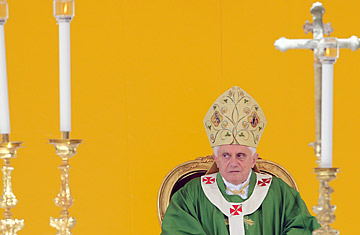
Pope Benedict XVI
The Pope will not be arrested. That non-news flash offers a taste of what Benedict XVI is up against in his historic four-day visit to Britain, which he will set off for on Thursday. It promises to be the chilliest — and potentially rudest — welcome of his 17 trips abroad.
The mere announcement of the visit last spring sparked name-calling and a campaign by well-known anti-religion activists like Richard Dawkins and Christopher Hitchens to have the Pontiff arrested for "crimes against humanity," for his alleged role in covering up priest sex abuse of minors. Peter Tatchell, a human-rights activist who has previously tried to perform citizen's arrests on Robert Mugabe and Henry Kissinger, conceded that the plans to push for Benedict's arrest were off. "The Pope has sovereign immunity from prosecution under British law. It wouldn't work," Tatchell told reporters this week after a meeting at Scotland Yard with Catholic Church and government officials. "It's not for want of wishing or trying."
Such extreme efforts by the few embody a more diffused antagonism that remains toward the 83-year-old head of the Roman Catholic Church in what is both a historically Anglican and increasingly secular British society. Benedict's traditionalist views on doctrinal matters like abortion and gay marriage — as well as the fallout from the abuse crisis — have set off a summer-long row about why taxpayers are picking up the $18 million tab for most of the security and organizational costs of Benedict's stay. Add to that the Pope's German roots — the trip coincidentally comes amid a round of remembrances for the 70th anniversary of the 1940 Nazi bombings during the Battle of Britain — and the trip becomes a tough sell for church handlers. "The British are generally suspicious of the Pope," says Robert Mickens, Vatican correspondent for the Tablet, a London-based Catholic weekly. "You add to that the origins and personality of this man, Joseph Ratzinger, and you have an even less sympathetic figure for many in Britain."
Still, the more pointed question for the Pope is the reaction of U.K. Catholics, a religious minority — sometimes oppressed — ever since King Henry VIII broke with Rome and established an independent Church of England in the 16th century. But even Britain's best-known recent Catholic convert, former Prime Minister Tony Blair, a liberal on social issues, typifies a brand of the faith that is out of step with the Pope's. Polls show that less than half of British Catholics agree with the Pope's stance on abortion rights, gay marriage and other hot-button issues, while thousands of tickets (ranging from £5 to £25 each) to the public papal events reportedly remain unsold on a trip that will take Benedict from Edinburgh and Glasgow, Scotland, to London and Birmingham, where he will preside over the beatification of Cardinal John Henry Newman, a convert from Anglicanism and one of the leading Catholic thinkers and theologians of the 19th century.
Indeed, Benedict sees himself at the center of the battle of ideas, and has used earlier trips to the heart of secularized Western Europe — Spain, France and even his native Germany — to challenge what he considers the slippery relativism of contemporary society. "Britain is the perfect place to address the church's place in meeting with modern world," says a senior Vatican official. The official says Catholic clerics in the U.K. have been more tepid than their counterparts elsewhere — notably, in the U.S. — in criticizing government policies that do not jibe with church doctrine. "They've been pretty slow and not very effective in facing down these new laws. The Pope can bring some real gravitas to these issues."
The Tablet's Mickens agrees that there is an opportunity for the erudite Pope to use his jaunt into the land of Oxford and Cambridge to flex his intellectual muscle. But he may also be constrained by the toxic mix of an unreceptive public and the no-holds-barred British media. "The Pope likes to go into major centers of secularism and make the Christian case for creating space for faith in God in modern society," says Mickens. "But he's in a bind, because if he's seen as being too harsh or fundamentalist, he could open up anti-Catholic sentiments, which are still very much present [in Britain]."
The lingering anger over the sex-abuse crisis makes the trip ever more tricky, especially in light of the revelations earlier this year that Benedict's own fingerprints may be on several poorly managed cases of abusive priests. The final minefield Benedict must manage is fallout from last year's Vatican announcement of a new policy for accepting disillusioned conservative Anglicans into the Catholic fold, a move that some Anglican leaders saw as encroaching on their flock and a backward step for ecumenical relations between the sister churches.
Still, despite the tricky itinerary and threats of protests, the Pope's presence often has a kind of calming effect on even the rudest publics. If that's the case, the next four days may end up being dominated by majestic images of what is the first ever papal state visit to the U.K. (John Paul II's 1982 trip was technically just a pastoral visit.) In that case, look for photo ops of Benedict with the Archbishop of Canterbury Rowan Williams, newly minted Prime Minister David Cameron and the Queen herself. And more non-news: the manners of all present will be impeccable.
